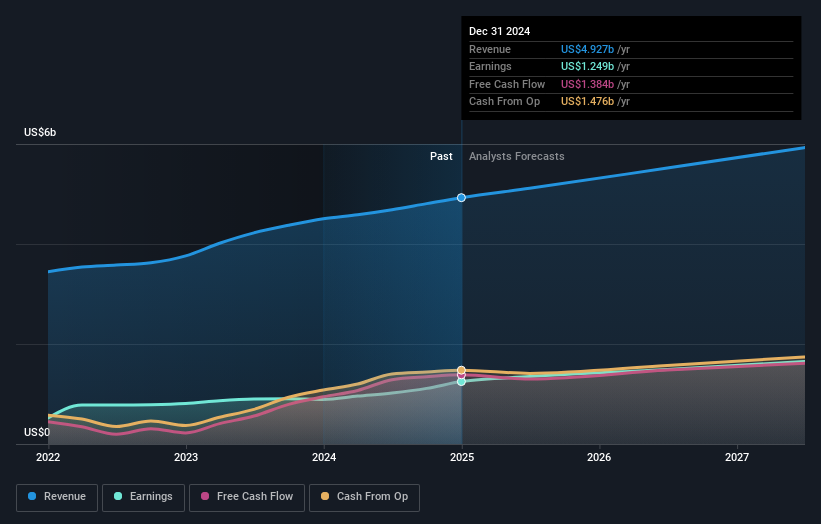- United States
- /
- Medical Equipment
- /
- NYSE:RMD
ResMed Inc. (NYSE:RMD) is a favorite amongst institutional investors who own 72%

Key Insights
- Institutions' substantial holdings in ResMed implies that they have significant influence over the company's share price
- A total of 25 investors have a majority stake in the company with 49% ownership
- Ownership research along with analyst forecasts data help provide a good understanding of opportunities in a stock
A look at the shareholders of ResMed Inc. (NYSE:RMD) can tell us which group is most powerful. The group holding the most number of shares in the company, around 72% to be precise, is institutions. Put another way, the group faces the maximum upside potential (or downside risk).
Because institutional owners have a huge pool of resources and liquidity, their investing decisions tend to carry a great deal of weight, especially with individual investors. As a result, a sizeable amount of institutional money invested in a firm is generally viewed as a positive attribute.
In the chart below, we zoom in on the different ownership groups of ResMed.
Check out our latest analysis for ResMed

What Does The Institutional Ownership Tell Us About ResMed?
Many institutions measure their performance against an index that approximates the local market. So they usually pay more attention to companies that are included in major indices.
ResMed already has institutions on the share registry. Indeed, they own a respectable stake in the company. This can indicate that the company has a certain degree of credibility in the investment community. However, it is best to be wary of relying on the supposed validation that comes with institutional investors. They too, get it wrong sometimes. It is not uncommon to see a big share price drop if two large institutional investors try to sell out of a stock at the same time. So it is worth checking the past earnings trajectory of ResMed, (below). Of course, keep in mind that there are other factors to consider, too.

Since institutional investors own more than half the issued stock, the board will likely have to pay attention to their preferences. We note that hedge funds don't have a meaningful investment in ResMed. The Vanguard Group, Inc. is currently the company's largest shareholder with 14% of shares outstanding. In comparison, the second and third largest shareholders hold about 8.9% and 4.7% of the stock.
Our studies suggest that the top 25 shareholders collectively control less than half of the company's shares, meaning that the company's shares are widely disseminated and there is no dominant shareholder.
While it makes sense to study institutional ownership data for a company, it also makes sense to study analyst sentiments to know which way the wind is blowing. There are a reasonable number of analysts covering the stock, so it might be useful to find out their aggregate view on the future.
Insider Ownership Of ResMed
The definition of company insiders can be subjective and does vary between jurisdictions. Our data reflects individual insiders, capturing board members at the very least. Company management run the business, but the CEO will answer to the board, even if he or she is a member of it.
Most consider insider ownership a positive because it can indicate the board is well aligned with other shareholders. However, on some occasions too much power is concentrated within this group.
Our most recent data indicates that insiders own less than 1% of ResMed Inc.. Being so large, we would not expect insiders to own a large proportion of the stock. Collectively, they own US$170m of stock. It is good to see board members owning shares, but it might be worth checking if those insiders have been buying.
General Public Ownership
With a 27% ownership, the general public, mostly comprising of individual investors, have some degree of sway over ResMed. This size of ownership, while considerable, may not be enough to change company policy if the decision is not in sync with other large shareholders.
Next Steps:
While it is well worth considering the different groups that own a company, there are other factors that are even more important.
Many find it useful to take an in depth look at how a company has performed in the past. You can access this detailed graph of past earnings, revenue and cash flow.
If you would prefer discover what analysts are predicting in terms of future growth, do not miss this free report on analyst forecasts.
NB: Figures in this article are calculated using data from the last twelve months, which refer to the 12-month period ending on the last date of the month the financial statement is dated. This may not be consistent with full year annual report figures.
New: AI Stock Screener & Alerts
Our new AI Stock Screener scans the market every day to uncover opportunities.
• Dividend Powerhouses (3%+ Yield)
• Undervalued Small Caps with Insider Buying
• High growth Tech and AI Companies
Or build your own from over 50 metrics.
Have feedback on this article? Concerned about the content? Get in touch with us directly. Alternatively, email editorial-team (at) simplywallst.com.
This article by Simply Wall St is general in nature. We provide commentary based on historical data and analyst forecasts only using an unbiased methodology and our articles are not intended to be financial advice. It does not constitute a recommendation to buy or sell any stock, and does not take account of your objectives, or your financial situation. We aim to bring you long-term focused analysis driven by fundamental data. Note that our analysis may not factor in the latest price-sensitive company announcements or qualitative material. Simply Wall St has no position in any stocks mentioned.
About NYSE:RMD
ResMed
Develops, manufactures, distributes, and markets medical devices and cloud-based software applications for the healthcare markets.
Very undervalued with outstanding track record and pays a dividend.


